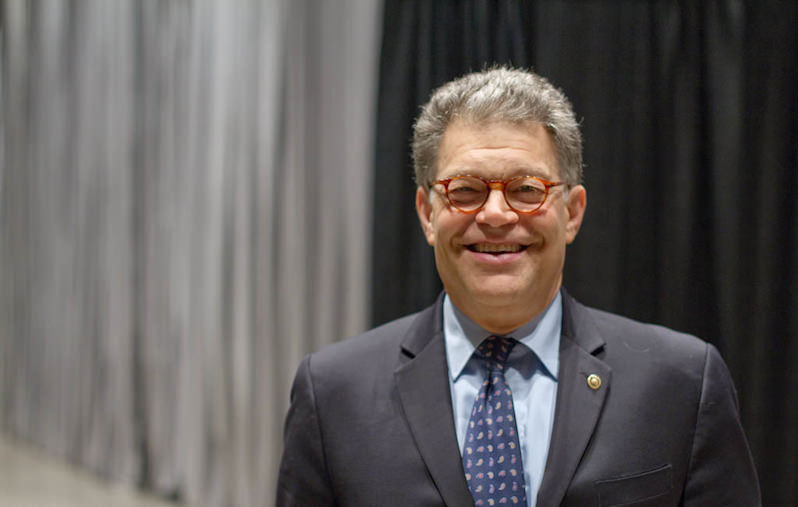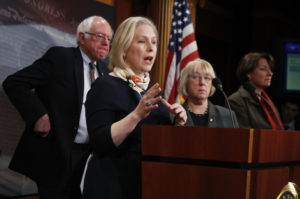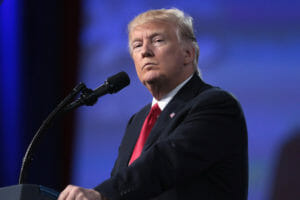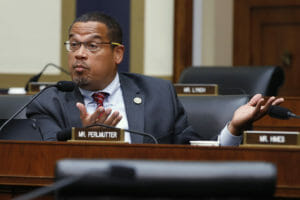Truthdigger of the Week: Sen. Al Franken, Vocal Supporter of the #NoDAPL Demonstrations
The Minnesota Democrat penned a letter to the Department of Justice on Monday, urging it to protect the First Amendment rights of the “water protectors” facing off against law enforcement in North Dakota.
Sen. Al Franken. (Mona T. Brooks / CC 2.0)
Many politicians have remained silent amid an increasingly troubling situation at the Standing Rock Indian Reservation in North Dakota. But Minnesota Sen. Al Franken broke away from his fellow Democrats after Sunday’s violent clash between “water protectors” and law enforcement.
The following day, Franken penned a letter to Attorney General Loretta Lynch, urging the Justice Department to intervene on behalf of the Standing Rock Sioux tribe and other peaceful demonstrators.
“The reported use of water cannons for crowd control in sub-freezing temperatures is excessive and unnecessary, and I urge you to take action to protect the First Amendment rights of [protesters], and the physical safety of all involved parties,” Franken wrote.
As a citizen of Minnesota, which also faces harsh winters, Franken understands the danger of water cannons in 20-degree weather. “Video of the incident appears to show that the water cannons were not simply being used for fire control, or even crowd control, but were often directed at small crowds or even individual [protesters],” he continued. “Combined with the onset of wintry weather, water cannons are extremely dangerous and potentially lethal weapons, and I urge you to investigate their use on [protesters].”
This is not the first time Franken has stood up for marginalized groups in the U.S. Earlier in November, when Donald Trump visited Minnesota, Franken denounced Trump’s “hateful vitriol” toward Minnesota’s “vibrant Somali community.”
“[He] insulted a group of Minnesotans that I am proud to represent every day in the United States Senate,” Franken wrote on Facebook.
When it comes to the demonstrations in Standing Rock, Franken’s outspokenness makes him an outlier. Many of his fellow senators (with the exception of Sen. Bernie Sanders) have little to say about the Dakota Access pipeline and its opposition.
“Senator Elizabeth Warren (D-MA) who has claimed to be Cherokee, said she opposes the pipeline when questioned by a supporter, but has avoided making any public comments on the issue,” wrote Michael Sainato for CounterPunch. “Democratic Party leaders in the Senate, including Senate Minority Leader Charles Schumer, have ignored the issue.”
One of the reasons for this silence is financial, according to Sainato. “[T]he Dakota Access Pipeline is being funded by some of the most prolific donors to the Democratic Party,” he wrote. “Sunoco Logistics Partners is set to acquire Energy Transfer Partners, the company constructing the pipeline, while Sunoco will oversee its operation. The owners of the company primarily consist of Wall Street firms, including Goldman Sachs.”
Franken, a longtime advocate of Wall Street reform, has publicly argued against tax loopholes and has opposed tax cuts for millionaires.
He also has a history of fighting for Native American communities in Minnesota. In 2014, for instance, he spoke at the Native American Political Leadership Program’s first symposium on native mentoring. And in 2013, he fought for Native American students by repeatedly opposing funding cuts to schools on reservations.
In fact, in 2008, when Franken was first running for the Senate, he voiced concerns about the treatment of Native Americans. In an interview with Chris Weigant for The Huffington Post, Franken noted that, if elected, he hoped to be on the Committee on Indian Affairs (he is currently a member of the committee, and has been since 2011).
Franken told Weigant that Americans “owe an historic debt to American Indians.” Using a bit of humor—he is, after all, a comedian as well as a politician—Franken continued: “They have a unique set of concerns that haven’t been addressed and I’d like to stand with them. Also, I’d like to get their views on immigration.”
Knowing that he’s spent years advocating for indigenous people in America, it’s easy to see why the current battle over the Dakota Access pipeline has caught Franken’s attention. And, as he notes in his letter, constitutional freedoms are at risk.
“I urge you to take action to protect the First Amendment rights of [protesters], and the physical safety of all involved parties,” he said in his letter to Lynch. “Native American populations have struggled for decades under the complex burden of historical trauma, and I have witnessed and admired how these communities have turned to their cultural foundations to build strength against that burden,” he continued. “These tactics against [protesters] exercising their Constitutional rights threaten to add another layer of trauma to these communities.”
The support of Congress is more crucial than ever as water protectors seek to overturn the proposed pipeline route. “[T]he Army Corps has made clear that pipeline construction under Lake Oahe—where the Tribe gets its drinking water—cannot occur without a federal easement,” Franken notes at the end of his letter.
The conflict between law enforcement and the #NoDAPL movement will no doubt continue, however, especially since the Army Corps of Engineers just ordered the shutdown of the the Oceti Sakowin camp, which houses many water protectors.
For the Standing Rock Sioux tribe to succeed in overturning the DAPL’s proposed route, it will need strong voices from America’s political establishments. Unfortunately, many in Congress are wary of lobbyists and are hesitant to publicly defend the #NoDAPL demonstrators.
Franken does not fall into this timid category of politicians. For his bold, timely statement to the Department of Justice, as well as for his years of support for Native American rights, we name Sen. Al Franken our Truthdigger of the Week.
Independent journalism is under threat and overshadowed by heavily funded mainstream media.
You can help level the playing field. Become a member.
Your tax-deductible contribution keeps us digging beneath the headlines to give you thought-provoking, investigative reporting and analysis that unearths what's really happening- without compromise.
Give today to support our courageous, independent journalists.








You need to be a supporter to comment.
There are currently no responses to this article.
Be the first to respond.